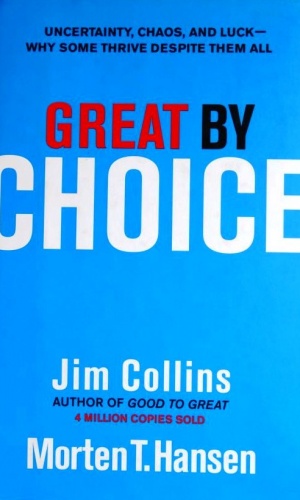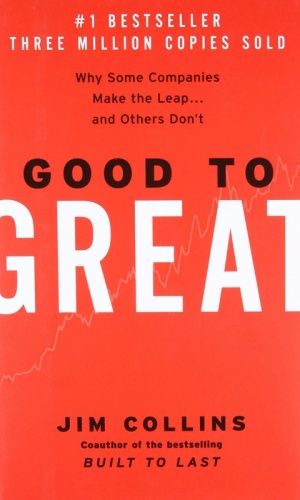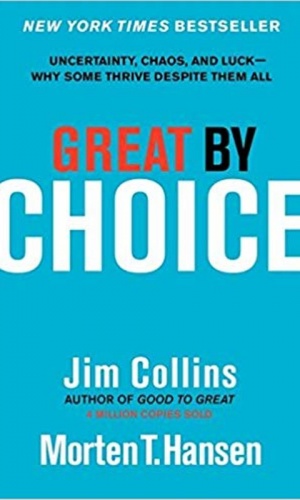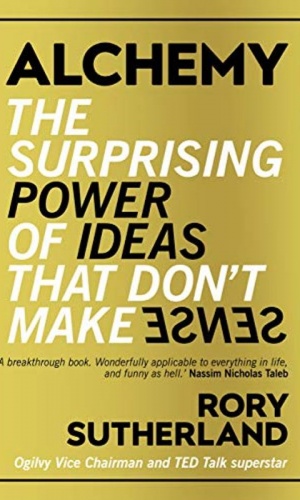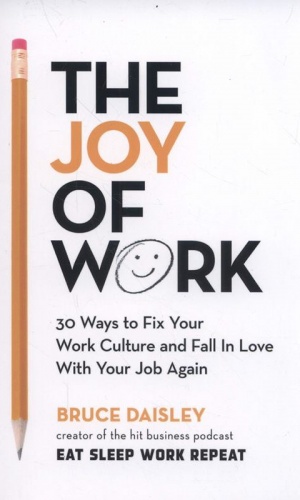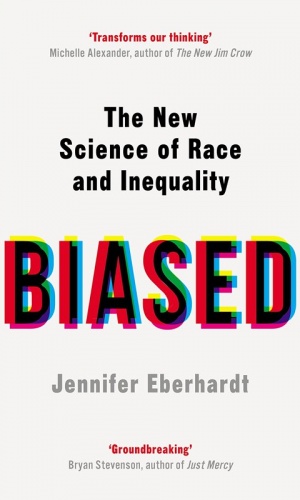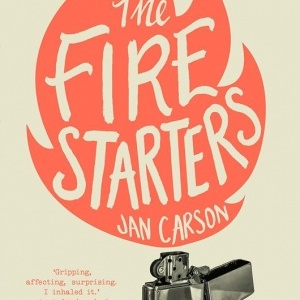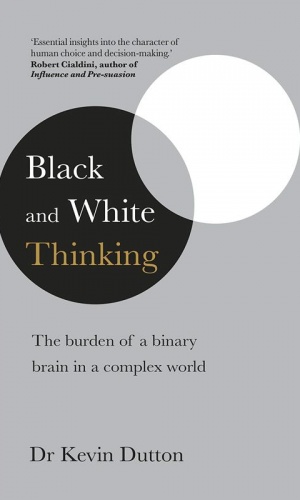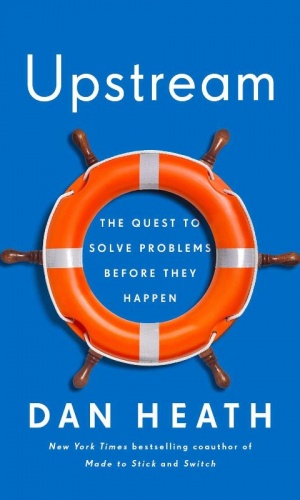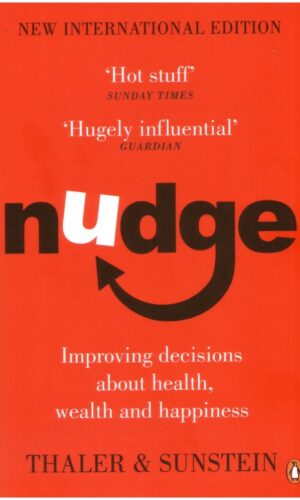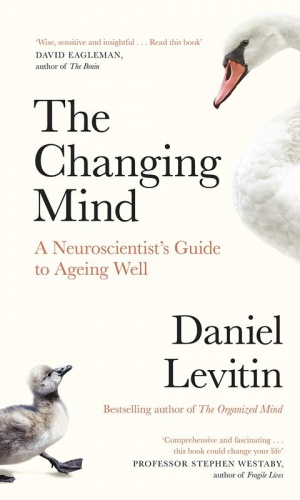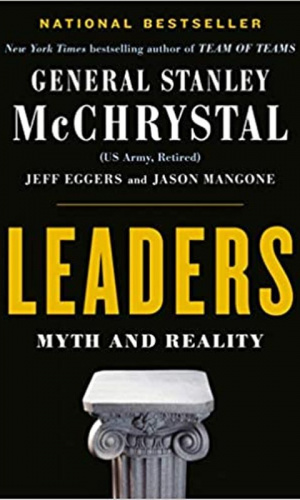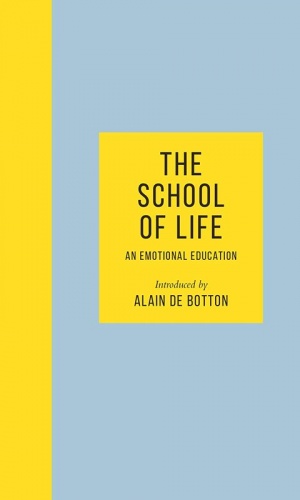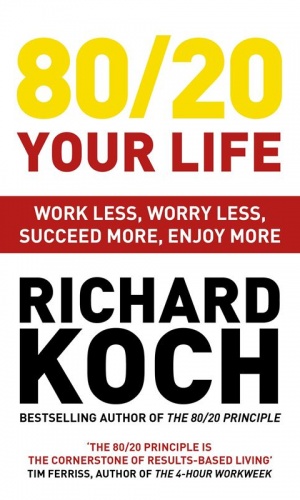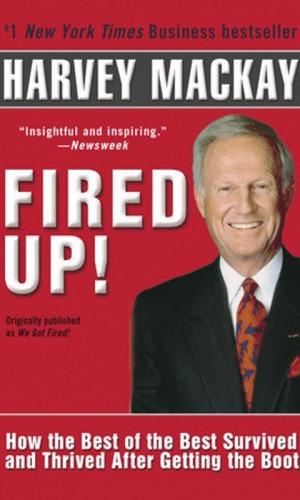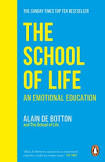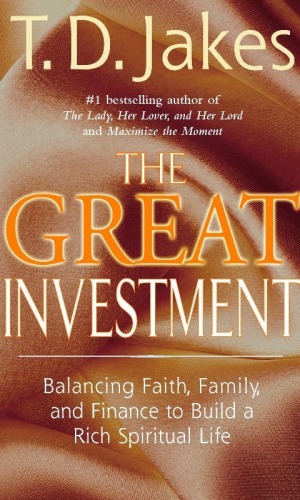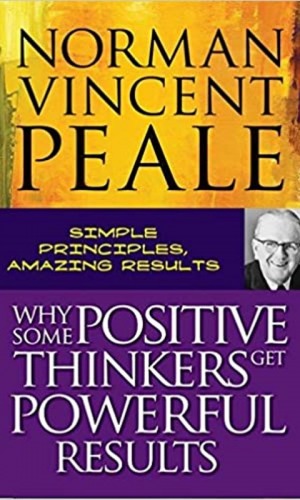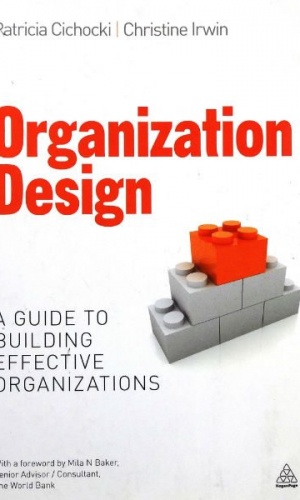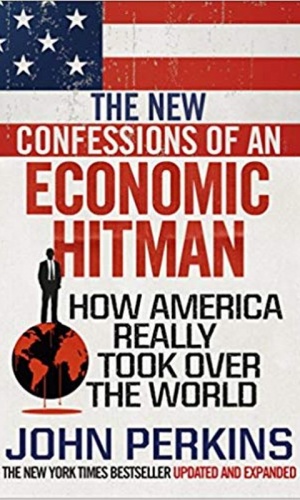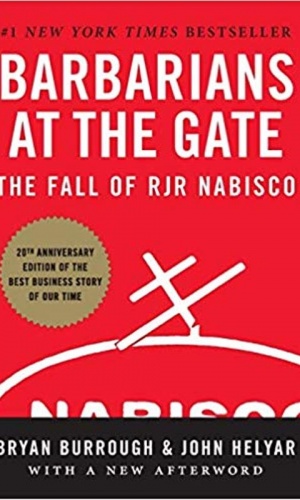-
Great by choice
en years after the worldwide bestseller Good to Great, Jim Collins returns with another groundbreaking work, this time to ask: why do some companies thrive in uncertainty, even chaos, and others do not? Based on nine years of research,buttressed by rigorous analysis and infused with engaging stories, Collins and his colleague Morten Hansen enumerate the principles for building a truly great enterprise in unpredictable, tumultuous and fast-moving times
₦6,500 -
Good to Great
Using tough benchmarks, Collins and his research team identified a set of elite companies that made the leap to great results and sustained those results for at least fifteen years.
₦6,500 -
Great by Choice
Ten years after the worldwide bestseller Good to Great, Jim Collins returns with another groundbreaking work, this time to ask: why do some companies thrive in uncertainty, even chaos, and others do not?
₦6,500 -
Alchemy
Why is Red Bull so popular – even though everyone hates the taste? Why do countdown boards on platforms take away the pain of train delays? And why do we prefer stripy toothpaste?
We think we are rational creatures. Economics and business rely on the assumption that we make logical decisions based on evidence.But we aren’t, and we don’t.
In many crucial areas of our lives, reason plays a vanishingly small part. Instead we are driven by unconscious desires, which is why placebos are so powerful. We are drawn to the beautiful, the extravagant and the absurd – from lavish wedding invitations to tiny bottles of the latest fragrance. So if you want to influence people’s choices you have to bypass reason. The best ideas don’t make rational sense: they make you feel more than they make you think.
₦6,500 -
The Joy Of Work
“This is a warm, wise and funny book which provides a terrific summary of some of the science – and stories – behind what makes work a positive part of people’s lives. From the importance of lunch to the value of laughter, this book gives witty and practical advice. I loved it and I’ve already started changing some of the things I do at work, as a result!” – Professor Sophie Scott
“Don’t quit yet! In this book, Bruce shares remarkable advice that may well have you laughing while you work and truly loving your job.” – Biz Stone, Twitter co-founder
₦6,500 -
Biased
You don’t have to be racist to be biased. Unconscious bias can be at work without our realizing it, and even when we genuinely wish to treat all people equally, ingrained stereotypes can infect our visual perception, attention, memory, and behavior. This has an impact on education, employment, housing, and criminal justice. In Biased, with a perspective that is at once scientific, investigative, and informed by personal experience, Jennifer Eberhardt offers us insights into the dilemma and a path forward.
₦6,500 -
The Fire Starters
Shortlisted for the EU Prize for Literature**’One of the most exciting and original Northern Irish writers of her generation’ SUNDAY TIMES’Gripping, affecting, surprising. I inhaled it’ LISA MCINERNEY ‘Captivating, intelligent and courageous’ IRISH TIMES’Spectacular. At once grittily real, wildly magical and insanely alluring – a siren-song of a novel. DONAL RYAN’Jan Carson seems to have invented a new Belfast in this gripping, surprising, exhilarating novel.
₦6,500 -
BLACK AND WHITE THINKING
Several million years ago, natural selection equipped us with binary, black-and-white brains. Though the world was arguably simpler back then, it was in many ways much more dangerous. Not coincidentally, the binary brain was highly adept at detecting risk: the ability to analyze threats and respond to changes in the sensory environment—a drop in temperature, the crack of a branch—was essential to our survival as a species.
Since then, the world has evolved—but we, for the most part, haven’t. Confronted with a panoply of shades of gray, our brains have a tendency to “force quit:” to sort the things we see, hear, and experience into manageable but simplistic categories. We stereotype, pigeon-hole, and, above all, draw lines where in reality there are none. In our modern, interconnected world, it might seem like we are ill-equipped to deal with the challenges we face—that living with a binary brain is like trying to navigate a teeming city center with a map that shows only highways.
In Black-and-White Thinking, the renowned psychologist Kevin Dutton pulls back the curtains of the mind to reveal a new way of thinking about a problem as old as humanity itself. While our instinct for categorization often leads us astray, encouraging polarization, rigid thinking, and sometimes outright denialism, it is an essential component of the mental machinery we use to make sense of the world. Simply put, unless we perceived our environment as a chessboard, our brains wouldn’t be able to play the game.
Using the latest advances in psychology, neuroscience, and evolutionary biology, Dutton shows how we can optimize our tendency to categorize and fine-tune our minds to avoid the pitfalls of too little, and too much, complexity. He reveals the enduring importance of three “super categories”—fight or flight, us versus them, and right or wrong—and argues that they remain essential to not only convincing others to change their minds but to changing the world for the better.
₦6,500 -
Upstream
So often in life, we get stuck in a cycle of response. We put out fires. We deal with emergencies. We stay downstream, handling one problem after another, but we never make our way upstream to fix the systems that caused the problems. Cops chase robbers, doctors treat patients with chronic illnesses, and call-center reps address customer complaints. But many crimes, chronic illnesses, and customer complaints are preventable. So why do our efforts skew so heavily toward reaction rather than prevention?
Upstream probes the psychological forces that push us downstream—including “problem blindness,” which can leave us oblivious to serious problems in our midst. And Heath introduces us to the thinkers who have overcome these obstacles and scored massive victories by switching to an upstream mindset. One online travel website prevented twenty million customer service calls every year by making some simple tweaks to its booking system. A major urban school district cut its dropout rate in half after it figured out that it could predict which students would drop out—as early as the ninth grade. A European nation almost eliminated teenage alcohol and drug abuse by deliberately changing the nation’s culture.
₦6,500 -
-
Business Adventures
What do the $350 million Ford Motor Company disaster known as the Edsel, the fast and incredible rise of Xerox, and the unbelievable scandals at General Electric and Texas Gulf Sulphur have in common? Each is an example of how an iconic company was defined by a particular moment of fame or notoriety; these notable and fascinating accounts are as relevant today to understanding the intricacies of corporate life as they were when the events happened.
Stories about Wall Street are infused with drama and adventure and reveal the machinations and volatile nature of the world of finance. Longtime New Yorker contributor John Brooks’s insightful reportage is so full of personality and critical detail that whether he is looking at the astounding market crash of 1962, the collapse of a well-known brokerage firm, or the bold attempt by American bankers to save the British pound, one gets the sense that history repeats itself.
₦6,600 -
The Changing Mind
What if the best was yet to come? Recent studies show that our happiness levels peak at age 82, and that our decision-making skills improve as we age. As more of us live past the age of 80, in this ground-breaking book, Dr Daniel Levitin uses cutting-edge research from neuroscience and psychology to demonstrate the benefits of getting older.
Packed with engaging interviews with individuals who thrived far beyond the conventional age of retirement, this book also reflects on challenges many readers will recognize. Levitin offers a realistic personal plan full of practical, cognitive enhancing tricks for everyone to follow over the years.
₦6,600 -
THE JOY OF MISSING OUT
Overwhelmed. Do you wake up in the morning already feeling behind? Does the pressure of keeping it all together make you feel anxious and irritable?
Tonya Dalton, CEO and productivity expert, offers you a liberating shift in perspective: feeling overwhelmed isn’t the result of having too much to do — it’s from not knowing where to start.
₦6,600 -
Leaders: Myth and Reality
Stan McChrystal served for thirty-four years in the US Army, rising from a second lieutenant in the 82nd Airborne Division to a four-star general, in command of all American and coalition forces in Afghanistan. During those years he worked with countless leaders and pondered an ancient question: “What makes a leader great?” He came to realize that there is no simple answer.
McChrystal profiles thirteen famous leaders from a wide range of eras and fields—from corporate CEOs to politicians and revolutionaries. He uses their stories to explore how leadership works in practice and to challenge the myths that complicate our thinking about this critical topic.
₦6,600 -
The School Of Life
We spend years in school learning facts and figures but the one thing we’re never taught is how to live a fulfilled life. That’s why we need The School of Life – a real organisation founded ten years ago by writer and philosopher Alain de Botton. The School of Life has one simple aim: to equip people with the tools to survive and thrive in the modern world. And the most important of these tools is emotional intelligence.
₦6,700 -
80/20 YOUR LIFE
80/20 YOUR LIFE shows how working out the few things that are really important, and the few methods that will give you those things, leads to increased happiness and greater success. When you read this book, you’ll discover why ‘less is more’ isn’t just a saying, but a sure-fire method to achieve your goals and live your best life.
₦6,700 -
FIRED UP!
Harvey Mackay, one of the world’s best-selling motivational and business authors tells you why it isn’t so. He reveals anecdotes and secrets from some of the best and brightest headliners in our world today.
₦6,700 -
Stop Saying You’re Fine
This hands-on guide from Mel Robbins, one of America’s top relationship experts and radio/tv personalities, addresses why over 100 million Americans secretly feel frustrated and bored with their lives and reveals what you can do about it.
₦6,700 -
-
The Great Investment
Bishop T. D. Jakes, preacher, author, motivator, and entrepreneur, is one of the most respected and influential voices in the country today. Now, in The Great Investment, Bishop Jakes empowers readers by laying out the blueprint for balanced successful living.
₦6,800 -
Why Some Positive Thinkers Get Powerful Results
Norman Vincent Peale, the man who taught America how to think positivitely, now offers a step-by-step, scientifically sound system for turning self-doubt into self-esteem, obstacles into opportunities, and thought into action.
₦6,800 -
Organization design
A complete guide to organization design, this book offers both an understanding of organizational theory as well as practical advice for how to implement OD in any organization. Divided into three sections, it covers the fundamentals of organizational design, provide a unique step-by-step methodology, and discuss solutions to recurring challenges.
₦6,850 -
The New Confession Of An Economic Hitman
Former economic hit man John Perkins shares new details about the ways he and others cheated countries around the globe out of trillions of dollars. Then he reveals how the deadly EHM cancer he helped create has spread far more widely and deeply than ever in the US and everywhere else—to become the dominant system of business, government, and society today. Finally, he gives an insider view of what we each can do to change it.
₦6,900 -
Barbarians At The Gate
The fight to control RJR Nabisco during October and November of 1988 was more than just the largest takeover in Wall Street history. Marked by brazen displays of ego not seen in American business for decades, it became the high point of a new gilded age, and its repercussions are still being felt. The ultimate story of greed and glory, Barbarians at the Gate is the gripping account of these two frenzied months, of deal makers and publicity flaks, of an old-line industrial powerhouse that became the victim of the ruthless and rapacious style of finance in the 1980s. Written with the bravado of a novel and researched with the diligence of a sweeping cultural history, here is the unforgettable story of the takeover in all its brutality.
₦6,900

